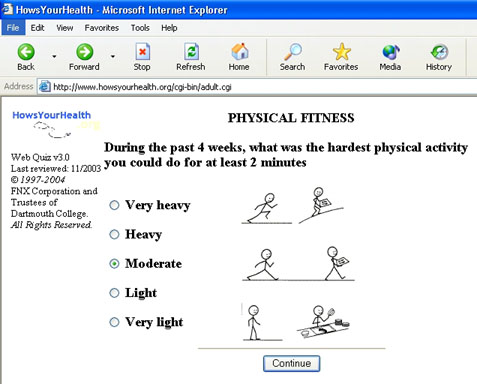How's Your Health is a community-based approach to improving health and health care that has been gaining national attention. Developed with Commonwealth Fund and other foundation support by John Wasson, M.D., of Dartmouth Medical School and Regina Benjamin, M.D., of Alabama's Bayou La Batre Rural Health Clinic, the program centers around an anonymous, free online survey http://www.howsyourhealth.org/) that lets people assess their health and receive information tailored to their particular needs. Individuals are encouraged to bring their health assessments with them on their next doctor's visit. With early tests indicating the program can improve care, community health alliances from Montana to New Jersey are now experimenting with ways to use How's Your Health to address local health issues. We asked Wasson and Benjamin how the project was progressing.
In your book, How's Your Health, America?, you wrote that health care professionals and their patients often are "not on the same page." How does the survey improve communication between providers and patients?
Regina Benjamin: I'm in solo practice, and I've noticed that patients don't always have the same idea as clinicians do. We want to know about blood pressure, while patients may want to know about colon cancer because their high school classmate just got diagnosed with it and it's been worrying them. The survey gives them a chance to express what they're thinking about.
Two thousand residents of Long Beach, California, and 1,000 residents of Mobile, Alabama, have taken the survey in pilot tests. What has been learned so far?
Benjamin: We were surprised to learn that in Mobile, a city of 250,000, one of people's top concerns was that there was nowhere to walk and get exercise. So, the city has been putting in sidewalks.
John Wasson: In Long Beach, we're learning that we have to reach out to people who lack access to computers or aren't comfortable using them. We may send vans equipped with computers into communities to facilitate the survey process. For elderly people, we rely on family members to help them take the survey. High school students have also helped seniors take the survey as part of their community service.
Benjamin: Most of my patients don't have computers, so we've set up a computer station in the waiting room. And now we're talking about going out to churches and other community centers with laptops.
This approach is also being used by Chicago's Chamber of Commerce as part of a workplace wellness program. What does How's Your Health offer businesses?
Wasson: In Chicago, smaller businesses were interested in doing something about their workers' health, but most commercial health risk assessments out there are prohibitively expensive and aren't tailored to what employers want. How's Your Health is inexpensive and easy to administer.
The survey is based on simple pictographs and straightforward questions. Why do you think this approach has been successful?
Benjamin: The idea is to put the patient in control--make them feel they can contribute to their care. This makes everybody more satisfied.
Wasson: Right, there's a huge amount of research that says patient-centered care is more effective and efficient, but the challenge is to actually implement this kind of care. How's Your Health started 25 years ago, when we did a study where doctors said they knew what mattered to their patients but were wrong half the time. That was a clear sign that something needed to change.

How can How's Your Health be part of larger quality improvement efforts?
Wasson: There's a lot of interest out there in improving access to health care. For example, large retail pharmacies are talking about having a nurse educator on the premises to help people check their blood sugar, maybe get a flu shot, and take a health assessment like How's Your Health.